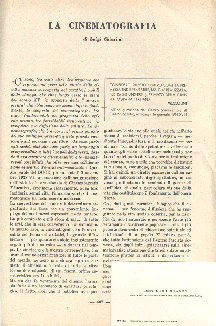


 

|
 
|
 |

In the beginning, at least, the rising success of modern Italian arts such as architecture and film was a separate phenomenon which paralleled the rise of Fascism. But beginning in the twenties, artistic movements were supported and then quickly absorbed by the Fascist regime for its own purposes. Luigi Chiarini's La cinematografia speaks of the "great awakening" of Italian film under the auspices of the Fascist regime, whose Istituto Luce (luce meaning "light") produced a film on agriculture. Chiarini's Centro sperimentale di cinematografia (of which he was director) ironically became a center for anti-Fascist intellectuals, among them a young Luchino Visconti, director of Ossessione and the recent film Senso. The center for the film industry in Rome, Cinecitta', inaugurated by Mussolini in 1937, is still Italy's most important center of film production.
A project of The Digital Scriptorium, Special Collections Library, Duke University.
December 1996
http://scriptorium.lib.duke.edu/mazzoni/exhibit/